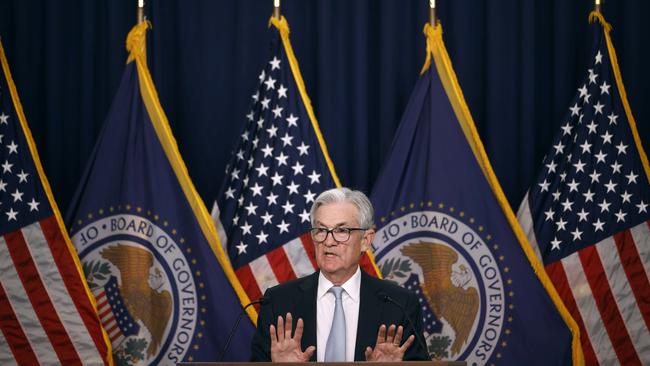Deutsche Bank tips a jump in unemployment and 25 per cent falls in major stockmarkets
A global recession – it’s a subject of much debate, but Deutsche Bank says there’s an inevitability about it.
A global recession will be hard to avoid as central banks battle inflation, according to Deutsche Bank.
If central banks follow through on their missions to lower inflation as they’ve indicated, the economic cost will be lower than if they were to ease policy as soon as recession hits. But history suggests that successful disinflation doesn’t come cheap.
The economists see a jump in unemployment rates and 25 per cent falls in major stockmarkets.
“It generally comes at a substantial cost in terms of jobs lost and output foregone,” wrote the bank’s chief economist, David Folkerts-Landau, and head of economic research Peter Hooper.
In their world economic outlook for 2023, the economists looked at all episodes in the US, Germany, Britain and Canada since the 1960s in which “disinflations” – peak-to-trough declines in a two-year trend or moving average of core inflation – of at least two percentage points occurred.
These periods were associated with increases in unemployment of at least two percentage points, and in most cases more, which is easily enough to cause at least moderate recessions in those economies.
The rises in unemployment were generally induced by central bank tightening aimed at quelling inflation that had risen to undesired levels, as is the case now.
They say a “stop-go policy pattern” of monetary tightening in the 1970s helped ingrain high inflation into expectations and wage-price setting behaviour in the US, Germany and Britain.
When central banks in the US, Germany and the UK did finally address the inflation problem in earnest in the early 1980s – it took a decade longer in Australia – they had to engineer severe recessions in order to return inflation sustainably to desired levels.
US and eurozone inflation trends are about 3-4 percentage points above the desired levels of their respective central banks, suggesting that they will struggle to lower inflation to acceptable levels without causing recessions.
Wage and price inflation in the US and Europe is now considerably higher than at any time since the last “great inflation” four decades ago, thanks to robust aggregate demand, very tight labour markets, and supply side shocks and constraints.
“We read the Fed and ECB as being absolutely committed to bringing inflation back to desired levels within the next several years,” the Deutsche economists wrote in a note. “Although the costs in doing so may be lower than in the past for reasons we lay out, it will not be possible to do so without at least moderate economic downturns in the US and Europe, and significant increases in unemployment.”
This comes at the start of a big week of economic data from the US, eurozone and China. Data include US GDP, PCE, ISM manufacturing and non-farm payrolls, eurozone CPI, China’s manufacturing and non-manufacturing PMIs, and Australian private new capital expenditure.
The week also sees communications from a number of Federal Reserve officials including chairman Jerome Powell. Comments from Fed officials this week have been resolutely hawkish.

The outlook has been complicated by record Covid-19 infection numbers and social unrest in China. Deutsche economists say recessions could be under way in Germany and the eurozone amid an energy shock from the Russia-Ukraine war. They expect a US recession to hit by mid-2023.
They see output declining 1 per cent in the eurozone and 1.25 per cent in the US next year. World growth slows to around 2 per cent in their view, a rate that’s typically seen as recessionary.
The downturns along with the aggressive monetary tightening and geopolitical and commodity shocks that induce them will be temporarily painful in financial and emerging markets.
They expect the current “bear market equity rally” in shares to lift the S&P 500 to 4500 points by June. But as an expected US recession takes hold, they see the S&P 500 slumping to 3250 points in the September quarter.
The impact of a recession will also be felt in credit, where US dollar high yield spreads should widen to 860bps by the end of 2023, and Euro high yield spreads should reach 930bps.
Fed funds rate risks are “skewed to the upside”, but they see a peak at 5.1 per cent in May after a downshift to 50bps in December. But as recession hits they expect the Fed funds rate to peak at 5.1 per cent in May. The US 10-year Treasury yield is expected to end 2023 little changed at 3.65 per cent as Fed tightening ends and recession starts. They see a meaningful reversal of the US dollar’s strength, with the US dollar expected to hit €1.15 by late 2023.
“We see major stockmarkets plunging 25 per cent from levels somewhat above today’s when the US recession hits, but then recovering fully by year-end 2023, assuming the recession lasts only several quarters,” the Deutsche economists write.
“The good news is that we also think the Fed and ECB will succeed in their missions as they stick to their guns in the face of what is likely to be withering public opposition as unemployment mounts.
“The moderate cost of doing so now will be much lower than failing to do so and having to deal with a more severely ingrained inflation problem down the road.”
However, tough medicine now may set the stage for sustainable recovery in 2024.




To join the conversation, please log in. Don't have an account? Register
Join the conversation, you are commenting as Logout